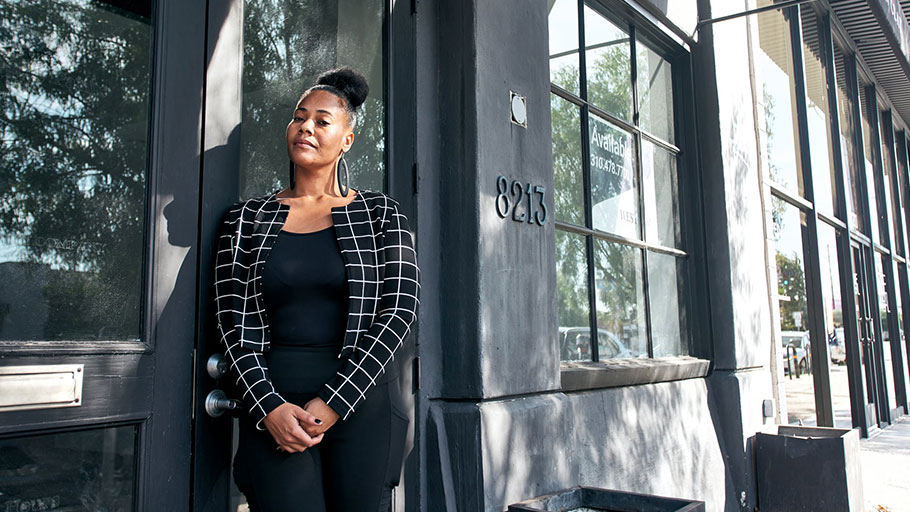Lanaisha Edwards rented this Beverly Grove storefront for her planned cannabis store that was eventually rejected by the city. Photograph: Damon Casarez/The Guardian.
Black merchants affected by the war on drugs are denied licenses and thrown into debt as white owners thrive.
A Los Angeles government program set up to provide cannabis licenses to people harmed by the war on drugs has been plagued by delays, scandal and bureaucratic blunders, costing some intended beneficiaries hundreds of thousands of dollars in losses.
Black entrepreneurs and activists across LA told the Guardian that the city’s embattled “social equity” program has left aspiring business owners on an indefinite waiting list, causing potentially irreparable damage to their families’ finances and preventing them from opening marijuana shops they have been planning for years.
Fewer than 20 of the 100 businesses on track to receive a license through the program appear to be black-owned, according to estimates from advocates, who say the community most disproportionately targeted by marijuana arrests is again facing discrimination. And even some of those applicants now face precarious futures.
Meanwhile, the existing LA industry is thriving – with many white business owners at the helm.
“How do you get to come and make millions of dollars off of our misery?” said Lanaisha Edwards, a south LA native who had applied for a cannabis license through the program. “The war on drugs destroyed so many families. We should at least get to come out on the other end and create some wealth out of it. But it’s not gonna happen the way this is going.”
‘This was supposed to be reparations’
Formally launched in 2018, LA’s social equity program received national attention and praise from activists as a potential model for the rest of the nation as more states move to legalize cannabis.
The city aimed to right some of the wrongs of criminalization by giving new retail licenses to people from communities historically harmed by marijuana laws, and by eliminating some of the traditional barriers in opening small businesses. Residents would be eligible if they were low-income and had cannabis arrests or convictions on their records, or lived in LA neighborhoods that were disproportionately targeted by the policing of pot.
“This was supposed to be our reparations,” said Rabin Woods, 57, who was arrested in 1983 for a marijuana offense and is now struggling to open a dispensary in LA.
LA law enforcement has a long history of profiling black and Latino residents, with data consistently showing disproportionate impacts in stops and searches, arrests and prison time. Under cannabis criminalization, black Americans were four times more likely to be arrested for marijuana than white people (and in some years, seven times more likely in LA).
After California became the first state to adopt medicinal marijuana in 1996, the loosely regulated medical sector that expanded in LA and other cities largely excluded communities of color.
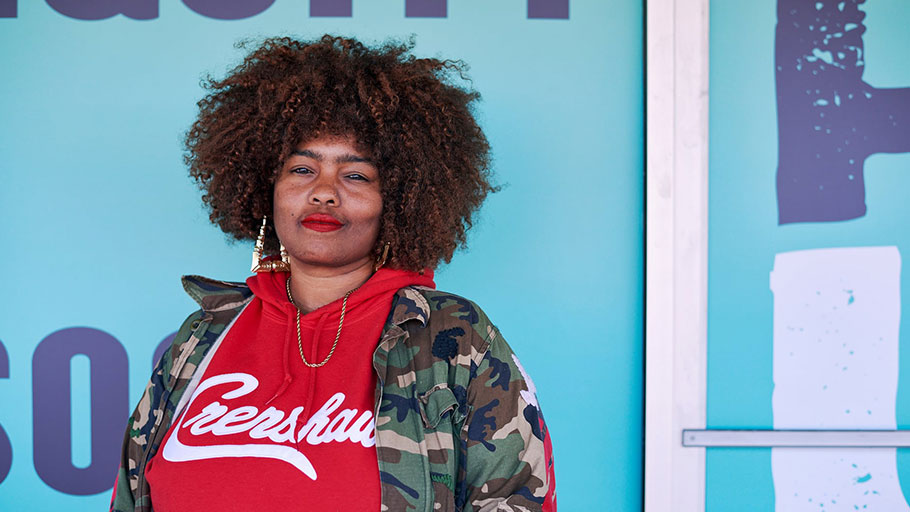
Kika Keith, a leading activist for social equity applicants, has been trying to open her own cannabis business in south Los Angeles for over a year. Photograph: Damon Casarez/The Guardian.
Out of nearly 200 cannabis retailers previously approved by the city of LA to do medical dispensaries, only six are black-owned, according to Virgil Grant, one of the six owners and a co-founder of the California Minority Alliance, which advocates inclusion. Even fewer are Latino-owned, he said.
Residents in LA were hopeful that the social equity process, launched after the state voted to legalize recreational pot, would start to close the glaring racial gaps. But targets of the program said the process quickly became a disaster.
LA’s newly formed department of cannabis regulation (DCR) first gave out licenses to businesses that were already running medical dispensaries and were considered grandfathered in under new laws. In a second round, the city doled out manufacturing and cultivation licenses for the people who wanted to legally grow cannabis.
The third phase was most critical and competitive: licensing new storefronts.
The city developed a “first-come, first-served” system for shops, and said it would give out 100 licenses to eligible social equity candidates. More than 1,800 people submitted initial applications .
When the application process officially launched on 3 September 2019, it was a high-stakes competition of who could send their online applications quickest.
“It went from social equity to who has the fastest internet,” said Brandon Brinson, who applied to open a dispensary. “It was like a rat race,” added Evelyn, his wife and business partner.
In December, the city admitted there were problems with the system. More than a dozen applicants had somehow received early access to the online portal. The city claimed it was a technical error that it remedied and that the mistake did not ultimately affect its consideration of applicants.
But activists and entrepreneurs cried foul, arguing it seemed the city had given some people an unfair advantage, and that the process was potentially corrupt.
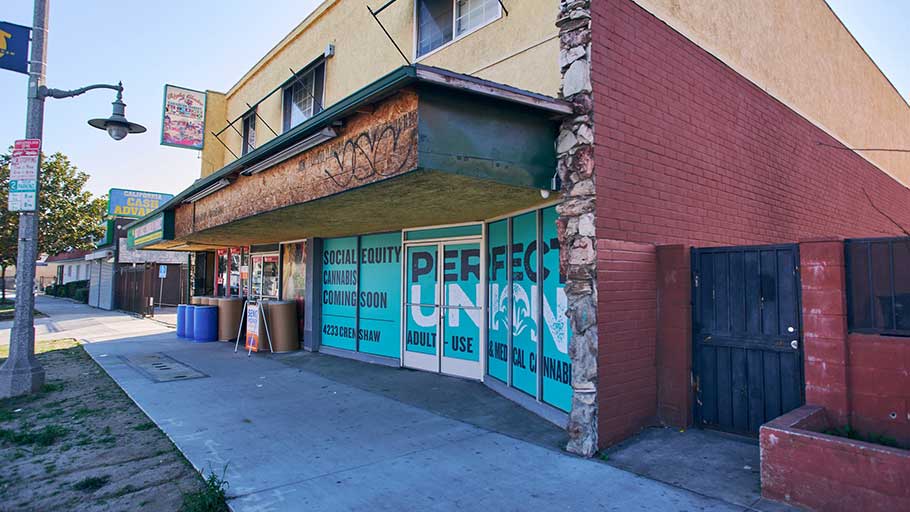
Kika Keith has rented this storefront for more than a year, waiting for the city to finalize her application for a cannabis business. Photograph: Damon Casarez/The Guardian.
The mayor ordered an “audit” of the program, and all licensing is now on hold.
In addition, many candidates who did make the top 100 list do not appear to be representative of the victims of LA’s war on drugs. The eligibility requirements were not specific to race, and activists said the geographical boundaries of the impacted neighborhoods were too broad, ultimately allowing a wide range of applicants who were not directly affected by marijuana arrests.
A DCR spokesperson said the agency does not collect demographic information on business owners and is legally barred from using race as a factor in the application process.
Activists estimated that only 18 of the people who made the top 100 list were African American. Some of them are still facing obstacles to launching.
Facing the fallout: ‘How could LA get this so wrong?’
In order to be eligible, the city required that applicants already possessed appropriate retail spaces, which meant many last year raced to start renting storefronts and securing investors. They are now faced with uncertain timelines and no guarantee of licenses.
Kika Keith, a leading activist for social equity applicants, who has also been trying to open her own cannabis business, has been renting a storefront in south LA for more than a year, waiting for the process to be finalized.
A single mother of three who grew up in the area where she’s renting her store, Keith is exactly the kind of candidate the program was supposed to support. Her family was torn apart by criminalization, with her stepfather sentenced to five years for selling a small amount of weed: “It changed our whole lives. The psychological impact of losing him … our whole family was disrupted. I’ve seen the damage.”
Keith planned to sell healthy infused cannabis beverages and support a youth program in the process: “My whole purpose was to reinvest in the community.”
She secured the 143rd spot on the city’s list, but with the uncertainty of the process and ongoing audit, her investors recently pulled out. Running out of time and money, she’s now questioning whether to give up her space. “I’m starting back at point A and there’s no end in sight.”
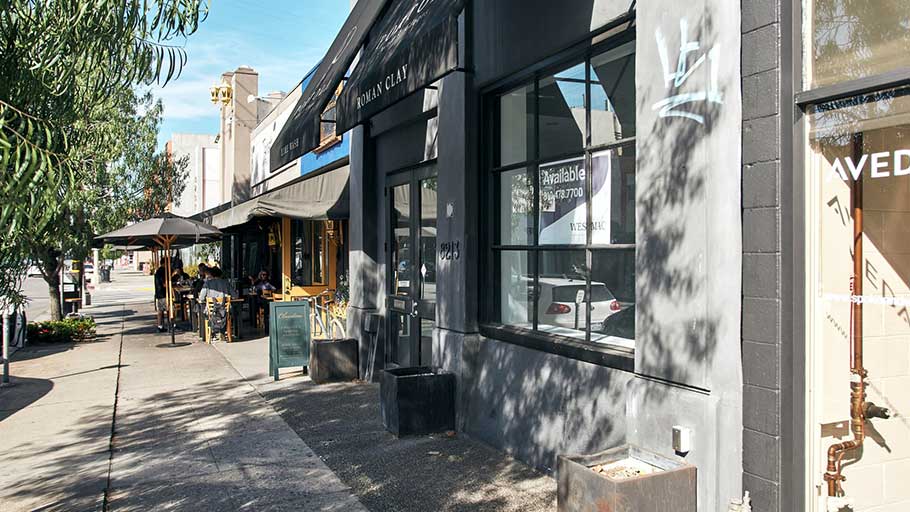
Lanaisha Edwards’ storefront for her cannabis business stands empty after she had to abandon her plans. Photograph: Damon Casarez/The Guardian.
Lanaisha Edwards, who was arrested for smoking pot as a teenager and had relatives spend years behind bars for marijuana offenses, had plans and a location for a Beverly Grove dispensary. It would secure financial stability for her family and emphasize healing by offering jobs for people targeted by criminalization, she said: “For my children, it would be a chance at generational wealth … and I’d be able to give some youth employment and show that people who look like them can go into business.”
At first, things look promising for Edwards, who has worked in gang intervention. She was 38th on the city’s list, had already rented a location, and had the backing of an investor. But Edwards said after months of back and forth, the DCR told her she was not eligible, because her store would be located within 700ft of an “existing dispensary”, violating city rules. She said the city had vetted her application, and that she had used DCR’s own cannabis webpage to confirm there were no dispensaries near her space.
After researching state records, she says she discovered that DCR appeared to be allowing a marijuana shop to move in down the street from her rental because it previously had a location elsewhere in LA. The company behind it also seemed to be primarily based in Oregon. Edwards had no choice but to give up her rental after more than a year of planning.
“You jump through all of the hoops … and it’s taken away from you,” she said, adding that it would be hard for would-be entrepreneurs to trust the city as the industry continued to leave people behind. “How the hell is the face of cannabis white now, how could that even be possible when you see who did all the time in jail? … How could LA get this so wrong?”
Evelyn and Brandon Brinson, both 33, downsized their home and sold a car to finance their planned marijuana business. Evelyn also sold an insurance agency she had run, and Brandon who is a barber, stopped paying rent for space at a shop. “Our whole life savings are in this project,” said Evelyn.
On a recent afternoon, the couple showed the Guardian around the still vacant store they had rent to house their dispensary. They pointed to empty glass shelves and the display counters that would feature their products. They estimate they have lost more than $200,000 on the endeavor.
Their application is number 200 on the list, and they don’t think they can hold on much longer.
“Why call it social equity and make people think that you’re helping the black and brown communities?” Evelyn said. “It’s stressful seeing everything that you’ve worked for in your entire life being placed in something that you thought was going to be an opportunity to help you and it has literally hurt you.”
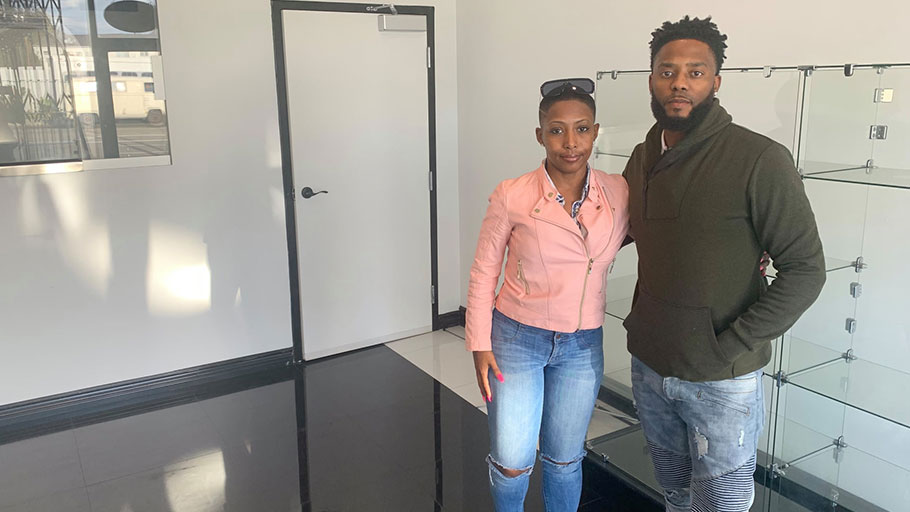
Evelyn and Brandon Brinson, estimate they’ve lost more than $200,000 on their planned marijuana business in Los Angeles. Photograph: Sam Levin/The Guardian.
‘We will fight for our place’
DCR did not respond to inquiries about the individual cases, and said it would not talk about the license process while the city’s audit was pending.
Cat Packer, the head of the agency and a former progressive activist, acknowledged the backlash in a recent in-depth interview with the LA Times, saying she could have done a better job managing people’s expectations. She added she was still dedicated to making social equity a reality. Packer declined the Guardian’s interview request, but a spokesperson noted that 150 additional licenses would become available in a later social equity round after the first 100.
Evelyn and Brandon co-own their business with Rayford Brown, a 57-year old LA resident who served a five-year sentence for a marijuana offense. He was wary from the beginning that the same government that locked him up to “teach him a lesson” when he was homeless and occasionally “selling weed to eat” would now want to help him be a legal marijuana entrepreneur.
“What is your actual objective in giving me a ‘second chance’? You have this cannabis industry that you consider the ‘right way’, but when I was convicted, there was no right way,” he said. “It’s absolutely amazing that we are even at this point where we’re literally fighting and waiting for approval from a state that convicted me and wanted to give me five years for the first time in my life over weed.”
Kika Keith, the activist who has been trying to open a cannabis business in south LA, said she was not ready to give up, and she would not stop advocating for others.
“This is for my children, but there is a bigger legacy beyond my own family. We are dealing with a multibillion-dollar industry that by no means wants us in it. It’s important for us to fight for our position in this industry.”
This article was originally published by The Guardian.

